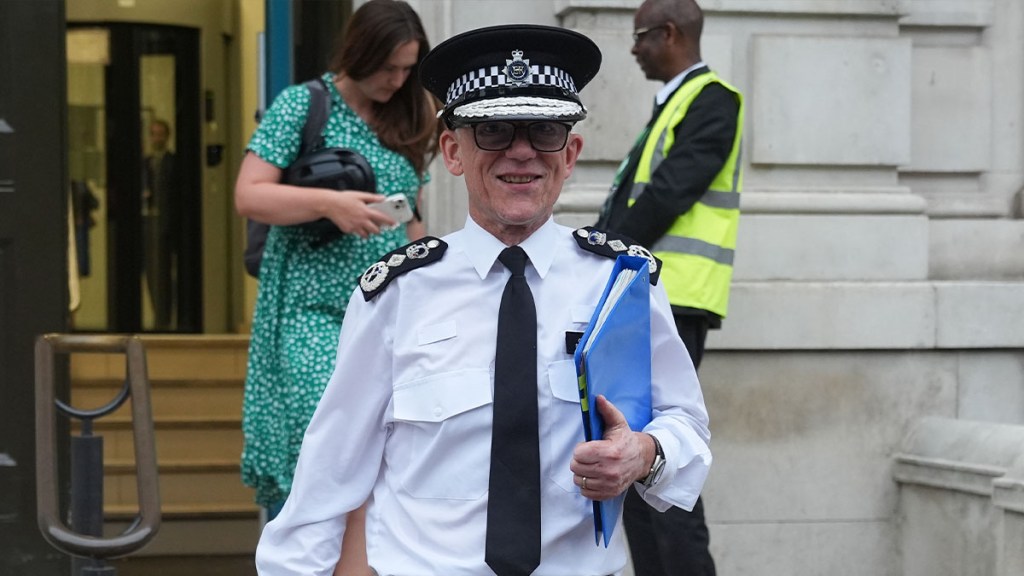Comments from a UK official have resurfaced in the wake of criticism that the country’s government allegedly allowed grooming gangs to operate with little consequence. They made statements that made some believe that the UK intends to extradite US citizens for online comments. We’ll take a look at the situation and laws about freedom of speech in the US vs. the UK.
What UK official said the UK will extradite US citizens for online comments?
In August 2024, citizens protested after a knife attack left three girls dead. Metropolitan Police Commissioner Sir Mark Rowley stated that the protests were fueled by misinformation and claimed the police would prosecute UK citizens violating the law on the streets and online. According to the New York Post, He claimed that the Metropolitan Police would take action against those “committing crimes from further afield online.”
Many interpreted Rowley’s comments as a threat to extradite and jail US citizens for posts online. It’s unclear if Rowley is unaware of the US’s robust freedom of speech protections or if his comments were misinterpreted. Regardless, there’s no precedent for a US citizen being extradited to the UK just for something they said online, and the concept it would ever happen is absurd.
Free speech protections in the United States
Citizens of the United States enjoy near-absolute freedom of speech protections. The First Amendment clearly states:
“Congress shall make no law respecting an establishment of religion, or prohibiting the free exercise thereof; or abridging the freedom of speech, or of the press; or the right of the people peaceably to assemble, and to petition the Government for a redress of grievances.”
These protections also include speech that could offend or scare others. In its review of Brandenburg v. Ohio, the US Supreme Court stated that citizens have the right to speak openly about revolution or violent action. Additionally, in reviewing R.A.V. v. City of St. Paul the US Supreme Court noted that even “hate speech” is covered by the First Amendment.
The major exception to the First Amendment is speech that incites “imminent lawless action.” So, a US citizen can advocate violence or hate toward a person or group as long as it isn’t meant to produce an immediate action.
For example:
- Permitted: “We should do something violent to someone sometime.”
- Not Permitted: “We should do something violent to someone right now.”
The former doesn’t advocate immediate violence, so it’s protected speech. The latter encourages listeners to commit an “imminent lawless action” immediately and wouldn’t fall under First Amendment protections.
Free speech protections in the United Kingdom
On the other hand, the UK’s “constitution” has never been explicitly codified and is instead an amalgam of written and unwritten arrangements that date back a thousand years. There’s no First Amendment equivalent that gives a simple statement of a UK citizen’s right to speech.
Furthermore, in the UK, hate speech is explicitly prohibited. “Expressions of hatred” based on race, religion, sexual orientation, and disability are all forbidden by the Public Order Act of 1986. More than one UK citizen has been arrested for making derogatory comments about others based on one of these characteristics.
The UK’s system of checks and balances also isn’t as robust as the US. The UK Parliament is sovereign, and there’s no supreme court to overturn legislation that is found to be unconstitutional. Additionally, unlike the US president, the UK’s Prime Minister isn’t part of a separate branch. Instead, they’re a direct part of the legislative framework, which means they’re involved with lawmaking instead of serving as a balance against it. As such, the UK government has less incentive to review regulations on free speech or challenge the status quo.
What are the chances of a US citizen getting extradited to the UK for online comments?
The bottom line is that there’s almost no chance of a citizen living in the US being arrested and extradited to the UK for just saying something “mean” online. US citizens are not subject to UK law when not in the UK. Additionally, there’s little chance of getting arrested for online speech under US law as it’s even harder to prove that it’s inciting “imminent lawless action.”







